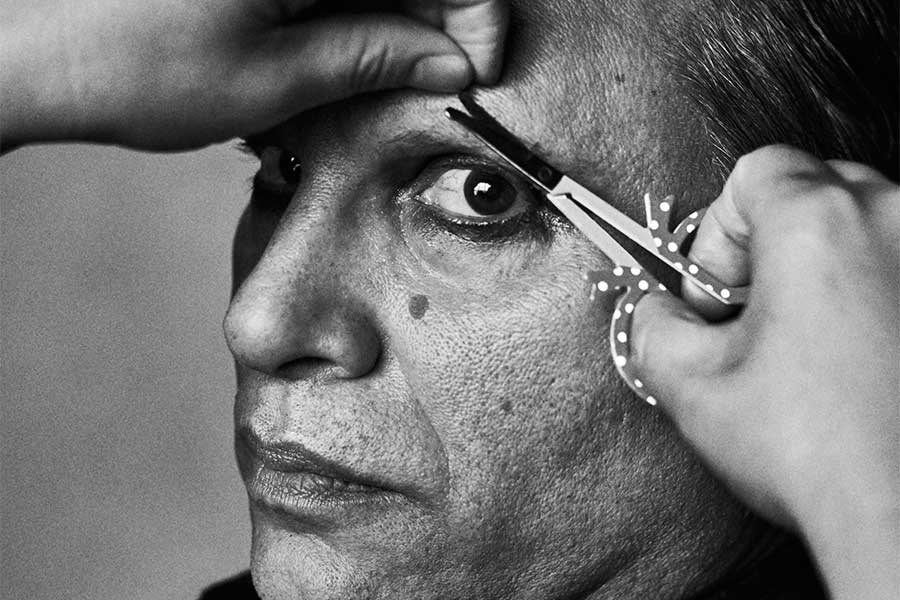
“Buzz,” is a beguiling documentary about Pulitzer-Prize winning journalist Buzz Bissinger finding his authentic sexual self.
Airing September 25 on HBO, the film flips the script as the man known for conducting interviews becomes the subject of the story. Bissinger is perhaps best known for his book, “Friday Night Lights,” and he wrote the iconic Vanity Fair cover story on transgender woman Caitlyn Jenner. The writer was engaged to help Jenner pen her memoir, and many scenes in “Buzz” depict this collaboration. Their working relationship, which includes some playful friction, has been described as that of a married couple, though both Bissinger and Jenner scoff at that idea.
Bissinger is married to his third wife, Lisa, who is also prominently featured in the documentary. Their relationship is loving and caring, but she has some very pragmatic observations about marriage, sex and her husband. She seems sympathetic and adds an intimate insider’s perspective to Buzz’s story.
It is less than 10 minutes into “Buzz” when Bissinger asks his son — over drinks at Butcher and Singer, on the eve of his son’s wedding — if the fact that he wears women’s clothing bothers his son. Buzz describes his cross-dressing as a form of self-expression and gushes about getting a pedicure, indicating his toenails will match the color of his wedding tux.
These revelations are presented matter-of-factly thereby removing any shock value. Director Andrew Shea presents his subject openly, which is why the film is compelling. He gives Buzz the opportunity — and Buzz never misses an opportunity — to talk about himself, his fetishes and his sexuality. “You can’t dress or live according to what others want,” Buzz states in a key moment of self-reflexivity.
To wit, Buzz is seen shopping in a high-end boutique in New York. He goes to Leatherman and coos about the whips, and cock rings, cages and fetish gear, and how he has engaged a dominatrix. (A video of him in a “scene” is shown later). He does a photoshoot for a German magazine, appearing in lipstick, a cape and heels, feeling comfortable, even empowered, at being able to express his true nature.
Is all of this conspicuous consumption and exhibitionism interesting? For those viewers who lean into this skewed portrait, it is. “Buzz” lets viewers decide what to think about Bissinger — how he looks, how he expresses himself and his comments and observations about gender. (“It’s irrelevant,” is one choice remark).
One does not have to agree. To the film’s credit, it prompts a consideration of the issues being presented as much as it does the people — Bissinger as well as Jenner — who are presenting them. For example, Lisa claims she accepts her husband’s cross-dressing, but she thinks if he is going to publish photos, he should look better in them. She also suggests her husband’s sexuality is best defined as “onanistic” — and when Buzz claims, “dressing in women’s clothing generates a sexual charge, a rush,” it helps make that case.
The film shows that Buzz, inspired by Jenner, is no longer scared to express his sexuality. He is overcoming decades of repression, having grown up buttoned-up. This actually shows why he is an appropriate collaborator for Jenner, as they talk about these issues but also talk about themselves. In one telling exchange Jenner has with Buzz, Jenner says she will never truly feel like a woman; that she did not grow up with the experiences women have. He challenges her, indicating that the trans community will take issue with that statement. Jenner replies, “But this is how I feel.” It is a remark delivered with candor and it reveals Jenner being her true self — like it or lump it. In another insensitive moment, Bissinger and Jenner create alphabet soup in a discussion about the LGBTQ initialism. Are they genderqueers just trolling here? Unlikely.
But “Buzz” counters these awkward bits with a sequence of Jenner and Bissinger at the University of Pennsylvania. During the Q&A, one gay male student asks Jenner a heartfelt question about her coming out. Another woman inquires about Jenner’s political leanings, which prompts Jenner to respond that she has received more flack for being Republican than for being trans. Jenner’s responses shed some light on what she and Buzz write in the book about her being “a public figure with a private shadow.”
Both Bissinger and Jenner think of themselves as role models. Both wished that they had become their true selves earlier in their lives. But they celebrate their difference, and who they are now, having evolved despite the pain, to achieve a measure of self-worth. “Buzz” is worthwhile, regardless of whether one supports or accepts them.
